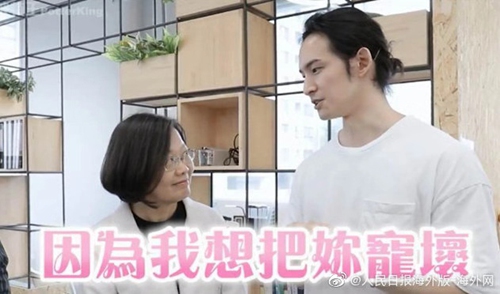HOME >> CHINA
Taiwan DPP exploited YouTuber to canvass more support in upcoming election: analyst
By Wan Lin Source:Global Times Published: 2019/12/17 22:53:40

Taiwan regional leader Tsai Ing-wen (left) and YouTuber Potter King. Photo: Sina Weibo
The attempt by the Taiwan Democratic Progressive Party (DPP) to co-opt popular YouTuber Potter King to canvass more support before the upcoming local election and provoke hatred between people across the Taiwan Straits was a lousy routine and Taiwan people should be wary of such tricks, a Chinese expert warned on Tuesday.
Taiwan regional leader Tsai Ing-wen, leader of the DPP, said in an interview on Monday that she was disappointed with Papitube, a Chinese mainland company that terminated cooperation with Potter King, a Taiwan-based YouTuber, after he called Tsai "president" in a video showing Tsai's visit to his startup and allegedly made remarks favoring Taiwan separatism on social media.
Xuzhou-based Papitube said Sunday that the decision was made as Potter King's remarks were "inappropriate" and "unacceptable."
The company's decision received strong support online from Chinese internet users.
The Potter King ban was being wrongly hyped by politicians in Taiwan, including Tsai, as a case of Chinese mainland authorities allegedly politicizing cultural exchanges, Yu Xintian, chairman of Shanghai Institute of Taiwan Studies, told the Global Times on Tuesday.
Tsai was trying to politicize the Potter King incident to win support from voters before the upcoming regional election which falls on January next year.
Yu noted that Tsai tried the same tactic in the 2016 election by supporting Chou Tzu-yu, a Taiwan-based K-pop star who supports Taiwan separatism in public.
It was just another "written script" by the DPP, some Taiwan internet users noted.
In the video, Potter King flirted with Tsai, saying "I want to spoil you," "you are my sweetheart" and "I am yours" which made some viewers "uncomfortable" and think Tsai lost her class as a leader.
The DPP intended to divert public attention from Tsai's poor performance into hostility toward the Chinese mainland "by hyping an individual business termination into a crackdown," Yu said.
Such low-level tricks were a classic DPP routine, but people in Taiwan should be cautious and not fall into its trap, Chinese experts warned.
RELATED ARTICLES:
Posted in: HK/MACAO/TAIWAN